Court Cases
All Cases
6 Court Cases
Dec 09, 2024
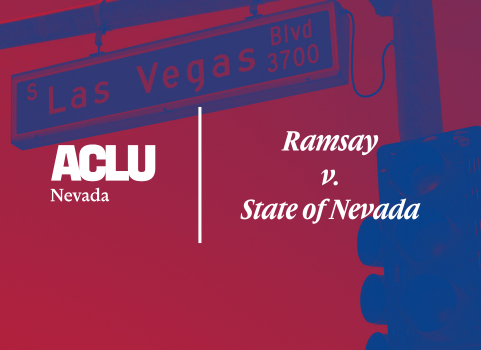
Ramsay v. State of Nevada
A Clark County court is banning people from the “Resort Corridor,” an expansive geographical area defined by Clark County ordinances, as a condition of probation without explanation or analysis for why this condition was imposed.
The probation condition infringes upon the First Amendment right to access a traditional public forum and the right to intrastate travel, protected in the Due Process Clause of the Fourteenth Amendment.
Probation conditions that restrict fundamental rights activities are only justified if they are directly tied to a permissible objective for probation, and the restriction is no greater than reasonably necessary to meet that objective. In imposing this probation condition, a Clark County court failed to satisfy both obligations.
Another concern raised in the amicus brief is that the streets and roadways throughout the "Resort Corridor" are public sidewalks and roadways that have historically been used for public assembly and debate.
Nov 20, 2024
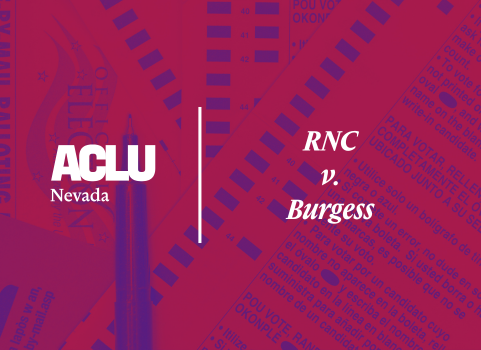
Republican National Committee v. Burgess
Nevada's "mailbox deadline" allows mail ballots received up to four business days after Election Day to be counted to account for the practical shortcomings of USPS policies and practices. For example, postmarks are not required on all mailings and are designed to prevent reuse of postage, and mail ballot postmarks may become smudged or illegible. To prevent arbitrary disenfranchisement of voters, mail ballots received by 5 p.m. on the third day after election day that are not clearly postmarked by Election Day are still counted.
The Republican National Committee (RNC) claims that this deadline violates federal law because there is only one specific day recognized by federal law as the national election day. We filed an amicus brief asking the court to dismiss the case as Nevada's "mailbox deadline" is a valid exercise of the state's delegated authority over federal elections by the Electoral Count Reform Act, which does not prohibit state laws that allow for timely cast ballots to be received and counted in the days following the election. Furthermore, there are also no federal laws prohibiting or conflicting with Nevada's Mailbox Deadline Laws.
Oct 01, 2024
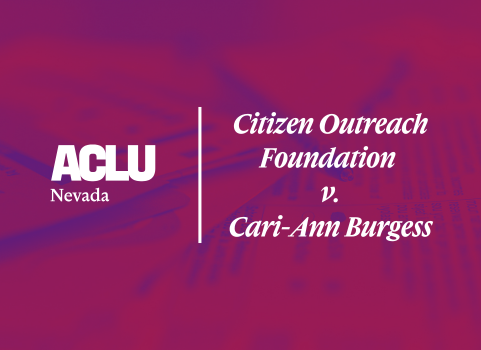
Citizen Outreach Foundation v. Cari-Ann Burgess
The ACLU of Nevada has filed a motion to intervene in a lawsuit filed by the Citizen Outreach Foundation. The lawsuit seeks to remove over 19,000 registered voters from the voter rolls in Clark County, seven of whom are ACLUNV members. The challenge is based on the use of the National Change of Address (NCOA) database, which the petitioners claim indicates that these voters no longer reside at their registered addresses.
The ACLU of Nevada argues that this method of challenging voter eligibility is unlawful under both state and federal law, particularly because such voter roll purges cannot be conducted within 90 days of an election. Furthermore, the organization argues that removing voters solely based on NCOA data without personal knowledge of their residency violates Nevada’s legal standards.
The ACLU is intervening to protect their right to vote and prevent unlawful disenfranchisement just weeks before the November 2024 presidential election.
May 30, 2023
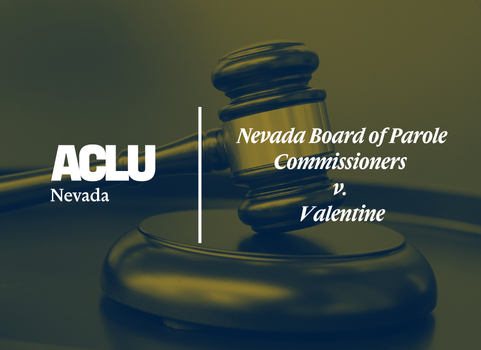
Nevada Board of Parole Commissioners v. Valentine
In this joint filing by the ACLU of Nevada and Nevada Attorneys for Criminal Justice, we argue that the state can't make it harder for people working toward rehabilitation to reenter society by imposing excessive fines and fees if they are already meeting the requirements of their parole.
The Nevada Division of Parole and Probation recommends early discharge from parole if a supervised person meets all the conditions in state law. One condition requires the person to be current with the supervision fees required by probation or parole.
A Clark County Court found that the subject of this case, Valentine, fulfilled this condition and had proven he experienced economic hardship and was eligible for relief. On appeal, the state claims that Valentine was ineligible for early discharge because he had not paid off the entire balance of supervision fees. No one disputes that Valentine paid his fees on time, but the parole agency diverted those payments to cover his outstanding restitution balance instead.
In the amicus brief, we pointed out that:
State law only requires a person to be current with supervision fee payments, not that they are paid them off in full.
The Division of Parole and Probation has no legal basis to transfer a person's supervision fees to restitution. There was no court order and no statute authorizing the agency to do it.
May 11, 2021
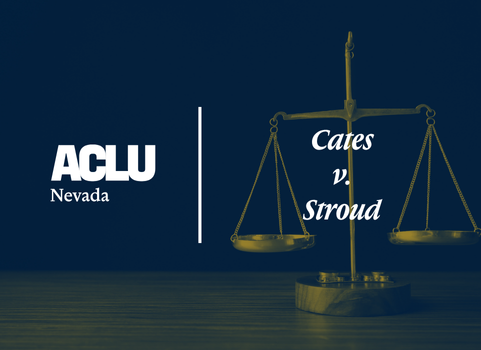
Cates v. Stroud
On May 11, 2021, the ACLU of Nevada and the Policing and Protest Clinic at the UNLV Boyd School of Law filed an amicus brief in Cates v. Stroud, a case on petition for review before the United States Supreme Court.
The case calls into question the qualified immunity doctrine and arises from an incident in which a Las Vegas woman was subjected to a humiliating strip search during a visit to Nevada’s High Desert State Prison in violation of her constitutional rights.
The brief urges the Supreme Court to grant the petition and review the case. For Nevada, qualified immunity creates a serious problem: If there are no state-level mechanisms for addressing civil rights abuses, and the federal courts won’t do it, how does our community protect their constitutional rights?
Jun 07, 2019
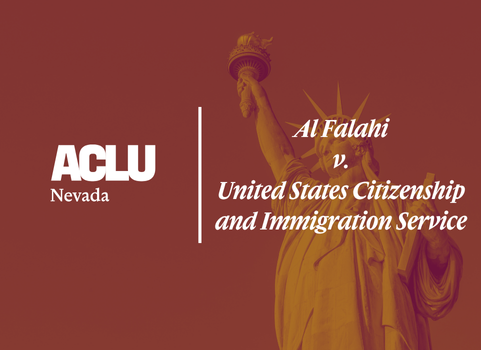
Al Falahi v. United States Citizenship and Immigration Service
The ACLU of Nevada and Prudhomme Law Office filed a petition for judicial review on December 16, 2016, with the Nevada District Court on behalf of Mr. Mohammad Al Falahi, seeking a de novo review of the denial of Mr. Al Falahi’s naturalization application by United States Citizenship and Immigration Services (USCIS). The petition alleges that Mr. Al Falahi is otherwise eligible for citizenship, but his application was denied solely because USCIS surreptitiously subjected him to the unconstitutional Controlled Application Review Resolution Program (CARRP).
CARRP is a little-known, unconstitutional program that disproportionally targets citizenship applicants from Arab, Middle Eastern, Muslim, and South Asian communities. Under CARRP, USCIS unjustifiably labels law-abiding citizenship applicants as “national security concerns” based on lawful religious activity, national origin, and innocuous associations. Applications subject to CARRP are subject to substantial delays and are ultimately denied for pretextual reasons, all without ever being told why their applications were treated differently than other applicants.
Stay Informed
Sign up to be the first to hear about how to take action.
By completing this form, I agree to receive occasional emails per the terms of the ACLU’s privacy statement.
By completing this form, I agree to receive occasional emails per the terms of the ACLU’s privacy statement.
